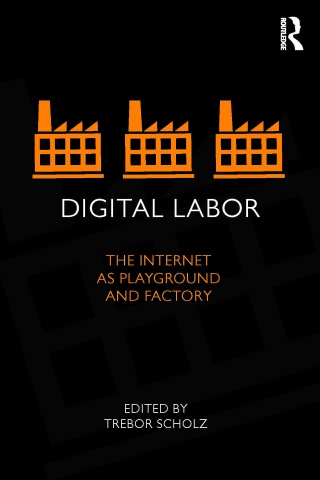Computational Culture, a Journal of Software Studies, Issue Four (2014)
Filed under journal | Tags: · computing, database, facebook, filesharing, networks, social media, software, software studies
“What marks much of the work presented in this issue of Computational Culture is its endeavour to pay more analytically precise attention to socio-technical formatting of the present, based on a common assumption that the specificities of computational forms are fundamentally constitutive of that present.” (from the Editorial)
With articles by Paul Dourish, Irina Kaldrack and Theo Röhle, Benjamin Grosser, Dennis Tenen and Maxwell Foxman, Alex Taylor, Jasmin Fisher, Byron Cook, Samin Ishtiaq; comments by Geert Lovink, Mark Marino; and a review section.
Editorial group: Matthew Fuller, Andrew Goffey, Olga Goriunova, Graham Harwood, Adrian Mackenzie
Published in November 2014
Open Access
ISSN 2047-2390
Trebor Scholz (ed.): Digital Labor: The Internet as Playground and Factory (2012)
Filed under book | Tags: · biopolitics, gift economy, internet, labour, neoliberalism, participation, play, playbour, politics, social media, technology, value, web, youtube

“Digital Labor calls on the reader to examine the shifting sites of labor markets to the Internet through the lens of their political, technological, and historical making. Internet users currently create most of the content that makes up the web: they search, link, tweet, and post updates—leaving their “deep” data exposed. Meanwhile, governments listen in, and big corporations track, analyze, and predict users’ interests and habits.
This unique collection of essays provides a wide-ranging account of the dark side of the Internet. It claims that the divide between leisure time and work has vanished so that every aspect of life drives the digital economy. The book reveals the anatomy of playbor (play/labor), the lure of exploitation and the potential for empowerment. Ultimately, the 14 thought-provoking chapters in this volume ask how users can politicize their troubled complicity, create public alternatives to the centralized social web, and thrive online.”
Contributors: Mark Andrejevic, Ayhan Aytes, Michel Bauwens, Jonathan Beller, Patricia Ticineto Clough, Sean Cubitt, Jodi Dean, Abigail De Kosnik, Julian Dibbell, Christian Fuchs, Lisa Nakamura, Andrew Ross, Ned Rossiter, Trebor Scholz, Tizania Terranova, McKenzie Wark, and Soenke Zehle.
Publisher Routledge, 2012
ISBN 0415896959, 9780415896955
258 pages
Reviews: Sebastian Sevignani (triple C, 2013), Andreas Wittel (Inf, Comm & Soc, 2014), Stephanie Anne Brown (Transformative Works & Cult, 2014), Gregory J. Downey (J Assoc Info Sci & Tech, 2015).
Conference (2009, from Archive.org)
Next conference (14-16 Nov 2014, CfP)
Publisher
Ulises Ali Mejias: Off the Network: Disrupting the Digital World (2013)
Filed under book | Tags: · activism, internet, liberation technologies, networks, social media, technology

The digital world profoundly shapes how we work and consume and also how we play, socialize, create identities, and engage in politics and civic life. Indeed, we are so enmeshed in digital networks—from social media to cell phones—that it is hard to conceive of them from the outside or to imagine an alternative, let alone defy their seemingly inescapable power and logic. Yes, it is (sort of) possible to quit Facebook. But is it possible to disconnect from the digital network—and why might we want to?
Off the Network is a fresh and authoritative examination of how the hidden logic of the Internet, social media, and the digital network is changing users’ understanding of the world—and why that should worry us. Ulises Ali Mejias also suggests how we might begin to rethink the logic of the network and question its ascendancy. Touted as consensual, inclusive, and pleasurable, the digital network is also, Mejias says, monopolizing and threatening in its capacity to determine, commodify, and commercialize so many aspects of our lives. He shows how the network broadens participation yet also exacerbates disparity—and how it excludes more of society than it includes.
Uniquely, Mejias makes the case that it is not only necessary to challenge the privatized and commercialized modes of social and civic life offered by corporate-controlled spaces such as Facebook and Twitter, but that such confrontations can be mounted from both within and outside the network. The result is an uncompromising, sophisticated, and accessible critique of the digital world that increasingly dominates our lives.
Publisher University of Minnesota Press, 2013
Electronic Mediations series, Volume 41
Creative Commons Attribution NonCommercial NoDerivs License
ISBN 0816679002, 9780816679003
193 pages

